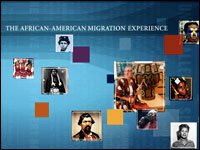Jacob Lawrence: The Migration Series
The Jacob Lawrence: The Migration Series is a project of the Phillip Collection to showcase the story and work of the painter Jacob Lawrence (1917-2000) in the context of the Great Migration period (1910-2010) in American history. Lawrence’s art focused on the experience and history of African Americans and was further impacted by his experiences during the Great Depression of the 1930s and after. During the Great Depression, Lawrence worked with the W.P.A., and in the decades that followed, he became one of the most celebrated African American artists who traveled the world and nation. The Migration Series is one of Lawrence’s most famous and impactful bodies of work that showcases the story of the Great Migration that reshaped the racial geographical layout of the nation throughout the 20th century. The Great Migration can be seen in two parts: an exodus from the Southern states during the early 20th century and then a return to those states in the later parts of the 20th century and into the early 21st century. Both mass movements were driven by economic and social hardships, and by the promise of work and personal freedoms. In the early parts of the 20th century, Black Americans did not have the same liberties and work opportunities in the South as they did in the North. Following the Black civil rights movement, a decline in job growth in the North, and the passage of the 1965 Civil Rights Act, Black Americans returned to the South.
Despite its narrow focus, the site readily lends itself to the classroom through its resources and engaging nature. There is an interactive map showing the movement of Black Americans during the migration period of 1910-1970 and the reverse migration of 1980-2010. Videos filled with contemporary commentary connected to the artworks of Jacob Lawrence are also shown, and a playlist with music connected to the overall theme of the project that further engages with the user. Additionally, there is a collection of primary sources, like photos and transcribed letters, showing what life was like during these migrations, shaping the social and cultural framework of the nation.
This project covers a largely overlooked part of American history in the classroom that did not impact Black Americans in an isolated manner, but the whole of the nation. The Great Migration fits into three main additional subjects already covered: the Black Civil Rights movement of the 1950s and ‘60s, the Interwar Period, and labor history. Often, the experiences and impact of Black Americans during the Interwar Period and labor history are not included to their full depth. This project allows for such inclusions within the class time used to discuss the Interwar Period and labor history, and a deeper understanding of the Black civil rights movement. The Great Migration and the Black civil rights movement are linked and feed from each other in the ebb and flow of people and their ideas across the nation.
This project can be used to explain the factors that led to the Black civil rights movement of the 1950s and ‘60s within a Civil Rights unit. Another unit this project works within is the Great Depression; highlighting the movement and experiences of Black Americans in response to the economic hardship of the Depression will allow Black American history to exist outside the silo, or units, covering slavery, the Civil War, and the Black civil rights movement. The Migration Series can be part of a larger effort to correct the over-fixation on white American history in a nation that is known as a melting pot.
